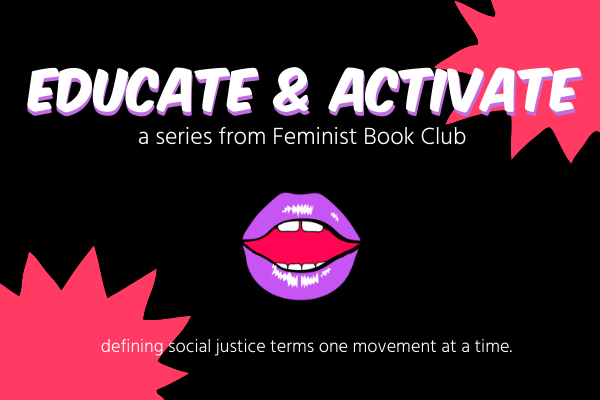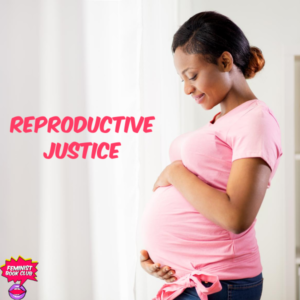Feminist Book Club blog contributors are working together to create posts as an “Educate & Activate” series. We will define a term or movement, provide historical context, and give you additional resources to learn more. We believe that an educated populace can be better activists, accomplices and co-conspirators. It is important to note that these are meant to be brief descriptions and not inclusive or exhaustive of all resources. We urge you to continue being curious, and continue learning more.
Definition
Reproductive justice is sometimes erroneously conflated with reproductive rights but, in actuality, it’s so much more than the legal rights we carry around reproduction and reproductive health. Rather, reproductive justice — as defined by SisterSong — is “the human right to maintain personal bodily autonomy, have children, not have children, and parent the children we have in safe and sustainable communities.”
The national policy initiative — In Our Own Voice: National Black Women’s Reproductive Justice Agenda — expands upon this, defining reproductive justice as “the human right to control our sexuality, our gender, our work, and our reproduction.”
“That right can only be achieved when all women and girls have the complete economic, social, and political power and resources to make healthy decisions about our bodies, our families, and our communities in all areas of our lives,” they write.
At its most basic, reproductive justice combines reproductive rights and social justice.
First Usage
In June of 1994, a group of Black women gathered in Chicago to discuss the inadequacy of the women’s rights movement in relation to the needs of women of color and other marginalized women and trans* people. At this time (and, hell, even today), the women’s rights movement was led by — and represented — primarily middle class and wealthy white women. This group of women in Chicago decided to form their own movement… one that centered their families and their communities.
They coined the term “reproductive justice” and named themselves Women of African Descent for Reproductive Justice.
History
After convening in 1994 and setting in place a human rights framework that centered women of color and low-income women, and that addressed issues of bodily autonomy with reproductive decision-making, the Women of African Descent for Reproductive Justice drafted a statement titled, “Black Women on Universal Healthcare Reform.” They went on to collect more than 800 signatures, after which they publicized the statement with full-page ads in both The Washington Post and Roll Call.
“Reproductive freedom is a life and death issue for many Black women and deserves as much recognition as any other freedom,” reads the statement, which goes on to demand funding for reproductive services such as prenatal care, contraception, and more.
Since then, reproductive justice organizations have worked to raise awareness around the limitations of a movement based upon “choice.” After all, low-income women and women of color are often unable to access many of the reproductive options that are readily available to middle- and upper-class white women, and the popular rhetoric around choice means that women with insufficient resources are often denounced for making “bad” choices.
These organizations have also sought to remind white women of a history in which birth control has been used to control the reproduction of “unfit” populations.
In January 2015, the leaders of five Black reproductive justice organizations launched the aforementioned In Our Own Voice: National Black Women’s Reproductive Justice Agenda in order to mobilize Black women around three key policy issues: abortion rights and access, contraceptive equity, and comprehensive sex education. They have since sought to influence public health policy by interrogating the power systems in place that decenter marginalized populations.
On their site, they quote Audre Lorde, who said, “There is no such thing as a single-issue struggle because we do not live single-issue lives.”
Resources for Further Education
To learn more about reproductive justice, you should check out the following:
“The History of Reproductive Justice,” a video from In Our Own Voice: National Black Women’s Reproductive Justice Agenda
“Why black women issued a public demand for ’reproductive justice’ 25 years ago,” in The Washington Post
The Blueprint for Sexual and Reproductive Health, Rights, and Justice
This fantastic resource list on reproductive justice from Racial Equity Tools
Reproductive Justice: An Introduction by Loretta Ross and Rickie Solinger
Killing the Black Body: Race, Reproduction, and the Meaning of Liberty by Dorothy Roberts
Our Bodies, Our Crimes: The Policing of Women’s Reproduction in America by Jeanne Flavin
The Movement for Reproductive Justice: Empowering Women of Color through Social Activism by Patricia Zavella



![This April we're diving into Muslim voices with some pretty incredible titles✨️
This members will also receive a sticker from @marhabaprints! Marhaba Prints is a South Asian and Islamic inspired online stationary store selling greeting cards, notepads, stickers, and more, that aims to be a bridge between Pakistani heritage, Islamic teachings, and Canadian culture.
As always we'll be discussing these titles in our online community! Join by April 9th to get one of these titles in your mailbox!
Learn more by heading to the link in our bio!
[alt text: three slides showcasing six books including: Hijab Butch Blue by Lamya H, All My Rage by Sabaa Tahir, Read Dangerously by Azar Nafisi, Read This to Get Smarter by Blair Imani, We Hunt the Flame by Hafsah Faizal, and You Exist Too Much by Zaina Arafat.]](https://www.feministbookclub.com/wp-content/plugins/instagram-feed/img/placeholder.png)
Pingback: A Timeline of Forced Sterilization by the United States